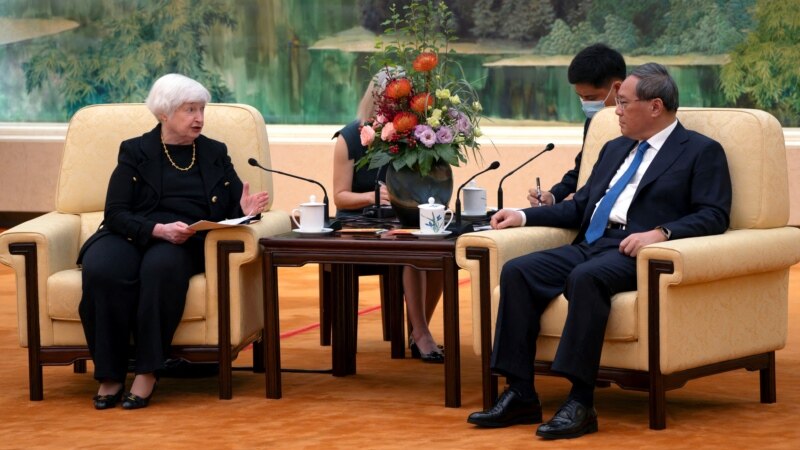
US Treasury Secretary Janet Yellen criticized China’s treatment of US companies and new export controls on metals used in semiconductors during a visit to Beijing on Friday.
Speaking to a group of businessmen, Yellen defended US controls on technology exports that irritate Beijing, saying they are necessary for national security and rejected suggestions that Washington is trying to decouple or separate the US economy from China’s.
“The United States seeks healthy economic competition with China,” Yellen said, according to a transcript released by her department.
However, he said he was “communicating concerns” that he has heard “from the US business community, including China’s use of non-market tools, such as expanding subsidies for its state-owned and domestic companies, and barriers to market access for foreign companies”.
Relations between the United States and China are at their lowest level in decades due to disputes over technology, security, Beijing’s military expansion and other irritant factors.
On Friday, Yellen met with China’s outgoing central bank governor Yi Gang and former vice premier Liu He, previously her counterpart in financial talks, according to the Treasury. She was later due to meet China’s number two leader, Premier Li Qiang.
Treasury officials previously said Yellen would not meet Chinese leader Xi Jinping and no progress was expected on major disputes.
The Chinese Finance Ministry called Yellen’s visit a “concrete move” to carry out an agreement between Xi and President Joe Biden during a meeting in November to improve relations. He did not give any indication of possible initiatives or commitments.
“There will be no winners in trade wars or ‘disengagement and broken chains,'” the ministry said in a statement. “We hope that the United States will take concrete steps to create a favorable environment for the healthy development of economic and trade relations.”
American and foreign companies are uneasy about their status in China following raids on consulting firms, the expansion of a national security law and calls by Chinese leader Xi Jinping and other officials for greater self-reliance.
“I have been particularly concerned by the punitive actions that have been taken against American companies in recent months,” Yellen said.
The Chinese government has been frustrated by US restrictions on access to advanced processor chips for security reasons. That threatens to delay or derail government efforts to develop telecommunications, artificial intelligence and other technologies.
Xi accused Washington in March of trying to hinder China’s development.
Beijing has been slow to retaliate, possibly to avoid disrupting its own tech industries. But this week the government announced unspecified controls on exports of gallium and germanium, metals used in the manufacture of semiconductors and solar panels. That announcement rocked South Korea and other countries that import from China.
Businessmen have warned that the world’s two largest economies could be split into separate markets with incompatible products as Beijing and Washington tighten trade controls and tell companies to reduce reliance on each other. They say it will hurt economic growth and innovation.
“I have made it clear that the United States is not seeking a complete separation of our economies,” Yellen said. “A decoupling of the world’s two largest economies would be destabilizing for the world economy and would be virtually impossible to carry out.”
Yellen defended the restrictions on US exports and rejected Chinese accusations that Washington uses them for economic advantage.
“I have also made it clear that the actions we take to protect our national security are designed to be narrow in scope, and are based on direct national security considerations and are not taken to gain economic advantage over China,” Yellen said. .
Connect with the Voice of America! Subscribe to our channel Youtube and activate notifications, or follow us on social networks: Facebook, Twitter and Instagram.







![[Img #74664]](https://thelatestnews.world/wp-content/uploads/2024/12/James-Watson-The-controversial-genius-behind-the-double-helix-150x150.jpg)





